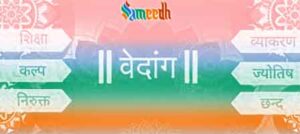“Vedang” refers to the six auxiliary disciplines associated with the study and understanding of the Vedas, which are the oldest sacred texts of Hinduism.

The Vedangas are a group of six ancient disciplines that serve as essential tools for understanding, interpreting, and preserving the Vedic texts, which are the foundational scriptures of Hinduism. The term “Vedang” is derived from two Sanskrit words: “Ved,” meaning knowledge, and “Ang,” meaning limb or part. Thus, Vedang translates to the “limbs of the Ved,” highlighting their role as auxiliary sciences that support the study and application of the Vedic knowledge.
The Six Vedangas
- Shiksha (Phonetics and Pronunciation):
- Shiksha focuses on the correct pronunciation and intonation of the Vedic mantras. Since the Vedas were transmitted orally for generations, precise pronunciation was vital to preserve their sanctity and meaning. Shiksha provides guidelines on articulation, accent, pitch, and rhythm.
- Chandas (Prosody):
- Chandas deals with the metrical structure of Vedic hymns. It is concerned with the patterns of syllables and rhythms that make up the verses of the Vedas. This knowledge ensures that the hymns are recited with the correct meter, which is crucial for their intended spiritual effect.
- Vyakaran (Grammar):
- Vyakarana is the study of Sanskrit grammar, essential for understanding the language of the Vedas. It lays down the rules for the structure and composition of words and sentences, ensuring that the sacred texts are interpreted and understood correctly.
- Nirukta (Etymology):
- Nirukta is the study of the meanings and origins of Vedic words. Given the symbolic and often archaic language of the Vedas, Nirukta helps in deciphering the deeper meanings behind the words and phrases, providing context and clarity.
- Jyotish (Astronomy and Astrology):
- Jyotish focuses on the movement of celestial bodies and their influence on human affairs. It is used to determine the timing of Vedic rituals and ceremonies, ensuring that they are performed at auspicious times.
- Kalpa (Rituals and Ceremonies):
- Kalpa is concerned with the practical aspects of performing Vedic rituals. It provides detailed instructions on the procedures and rules for conducting various religious ceremonies, sacrifices, and rites as prescribed in the Vedas.
Importance and Legacy
The Vedangs are not just academic disciplines but practical sciences that ensure the correct transmission, interpretation, and application of Vedic knowledge. They bridge the gap between the abstract and often complex teachings of the Vedas and their practical use in rituals, spiritual practices, and daily life.
Over time, the Vedangs have greatly influenced various aspects of Hindu thought, culture, and practice. They have also played a crucial role in preserving the Vedic tradition, especially during times when the oral transmission of the Vedas was paramount. Scholars and priests continue to study the Vedangs to maintain the integrity of the Vedic texts and rituals.
In summary, the Vedangs are integral to the Vedic tradition, providing the necessary tools and knowledge to engage with the Vedas fully and accurately. Their study is essential for anyone seeking a deep understanding of the Vedic scriptures and the rich spiritual heritage of Hinduism.